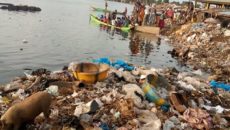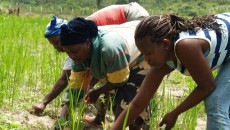HARPER, Maryland – In Harper, almost all aspects of the economy are dominated by Liberia’s neighbor, Ivory Coast, according to interviews with local trade groups in the city.
Rose Mamie Ellist, a marketer in the city, said the reason Harper depends on Ivory Coast for almost every good is because of the bad road network connecting the city to Monrovia coupled with the easy access to Ivory coast.
“We can leave Harper today for Ivory Coast and come back the same day, and in five or four days we get our goods,†she said. “For Monrovia, the first challenge is the exchange rate, the high rate of goods, and the bad road connectivity; and for that, we prefer going [to] Ivory Coast that is more accessible and affordable.â€
Abraham C. Wilson,, the general county superintendent of the Liberia Marketing Association told The Bush Chicken that almost everything sold in Harper, including rice, frozen food and pepper, come from Ivory Coast. Wilson said Maryland’s physical disconnection from the rest of the country due to bad roads means that many of the goods available on the market come from Ivory Coast, which is much easier to access than Monrovia because of the significantly cheaper transportation costs.
But Wilson said there are areas of the economy that do not depend as much on transporting goods to Monrovia that Maryland residents still are not taking advantage of. For example, he said the county mostly does not produce the staple food, rice, because of a combination of two factors: the soil in Harper is not optimal for rice production and farmers in the region have little interest in farming rice. Rather, they prefer to grow sugar cane, which is generally used to produce cane juice, the alcoholic beverage.
Wilson said another sector that depends little on transportation costs but is still dominated by foreign influence is the fishery sector, which he said is controlled by the Ghanaians.
“We have no control over our economy and that is why everything has gone sky high,†Wilson said. He called on the government to reopen the Agricultural Cooperative Development Bank that will give farmers loans to help boost their businesses and attract more people into farming.
Reopening the failed bank was a promise often highlighted by several presidential candidates in the 2017 elections, including Charles Brumskine and Benoni Urey.
Although the bank provided significant assistance to farmers and rural dwellers, controls at the former institution were severely lacking, and the bank operated at significant losses before it was shuttered. Additionally, a strategy document by the Ministry of Agriculture said the bank did not adequately serve smallholder farmers.
Wilson also called for other policies that he believed would help the economy in Harper: “For us to have control over our economic, our policymakers need to pass the Liberalization bill that will give rights to Liberians in certain businesses and we should start using one currency instead of two currencies.â€
Martha Wallace, the head of a union of fish sellers in Harper, said her group faces many challenges. She noted that members of her group prefer to get their frozen goods from Ivory Coast, as opposed to Monrovia, but this means Liberia loses on potentially valuable trade.
Moreover, for the fish acquired locally, Wallace said most of the Liberian fishermen lack their own boats because of their limited income. She called on county leaders to help assist local fishermen to purchase fishing boats that can be owned by the county.
It is not clear whether Maryland’s newly appointed officials will heed the advice of the marketers to institute policies to improve Liberian ownership of the local economy. The new government officials were just installed within the past two weeks, and many ministry representatives are not yet active. Moreover, local officials lack the power to make most of the suggested policy changes.
Featured photo by Mafanta Kromah



